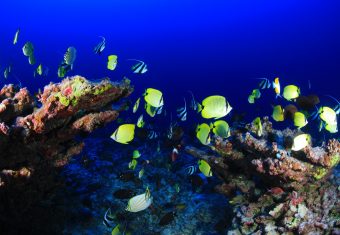
Beneath the ocean surface, an expansive network of dynamic skeletal-like invertebrates harbours at least 25 percent of all known marine species. Both hard and soft corals provide the basis for functioning coral reefs, which are some of the planet’s most biologically diverse and valuable ecosystems. They provide important cultural, economic, recreational and social benefits to hundreds of millions of people. They buffer shorelines against damage from storms and provide a source of medicine. And they are dying.
Coral reefs are under relentless stress from myriad global and local issues, including climate change, declining water quality, overfishing, pollution and unsustainable coastal development.
“Coral reefs are one of the most sensitive ecosystems globally to the ravages of human activities,” says Gabriel Grimsditch, United Nations Environment Programme (UNEP) marine ecosystems expert. “They are especially vulnerable to climate change and warming ocean temperatures, and mass coral bleaching and mortality events are predicted to increase in frequency and intensity as temperatures continue to rise.”
How do coral reefs die?
When corals are impacted by these environmental stressors, they expel the microscopic symbiotic algae zooxanthellae from their tissues. Because this is their primary food source, corals become more sensitive to environmental stressors and turn pale or white, hence the term ‘coral bleaching’. To recover from bleaching, corals need to re-absorb the zooxanthellae, which is only possible when the effects of environmental stressors are mitigated.
“The loss of foundational species like corals that provide important habitat can have devastating consequences and knock-on effects on the thousands of unique and wonderful species that call coral reefs their home,” says Grimsditch.
How healthy are the world’s coral reefs?
According to the “Status of Coral Reefs of the World 2020” report, a quantitative analysis of a global dataset spanning from 1978 to 2019 co-produced by UNEP, the International Coral Reef Initiative (ICRI), the Global Coral Reef Monitoring Network (GCRMN) and various international partners, 14 percent of the world’s corals was lost between 2009 and 2018.
More:
A 70-90 percent decrease in live coral on reefs by 2050 may occur without drastic action to limit global warming to 1.5°C. Even with urgent reductions to greenhouse gas emissions, global ocean temperatures could still take decades to stabilize.
However, the report notes that “high coral cover and diversity” means that coral reefs are resilient and can recover if we safeguard the marine environment and create the right conditions.
What can we do to save coral reefs?

Decision-makers must be decisive in leading urgent climate action to ensure coral reefs survive. For one, including coral reefs as a priority ecosystem in the UN Convention on Biological Diversity Post-2020 Biodiversity Framework would hold governments, businesses and other stakeholders accountable for safeguarding their health. Beyond the UN Climate Change Conference in Glasgow, decision-makers must go beyond the goals of the Paris Agreement to secure a future for coral reefs.
Meanwhile, reducing local anthropogenic pressures through legislation, education and other means would promote reef resilience. “Climate action and reduction of localized threats must go hand-in-hand if we want coral reefs to survive for future generations to enjoy and benefit from them,” says Grimsditch.
How is UNEP addressing coral reef health?
UNEP sets the environmental agenda and serves as an authoritative advocate for the global environment. It addresses coral reef health through the lenses of science, management, policy and funding.
In association with its partners, UNEP releases important reports on coral reef topics such as restoration, bleaching projections, international policy, economic value and more to provide decision-makers and the public with reliable information and recommendations.
NEP leads numerous initiatives that address marine life and ecosystem health, such as the Regional Seas Programme, which implements region-specific activities. Glowing Gone advocates for priority protection for coral reefs. The Clean Seas campaign is the most powerful global coalition devoted to end marine plastic pollution.
UNEP is a member of the Global Fund for Coral Reefs, an international alliance establishing a new paradigm for coral reef conservation through a fundraising and grant campaign. UNEP is also part of the ICRI and the Green Climate Fund, and it supports both the GCRMN and the Global Fund for Coral Reefs, important voices in coral reef advocacy and protection.
Source: UNEP



